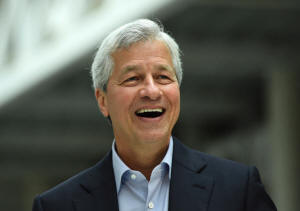|
JPMorgan has clutch of
CEO understudies, people guessing on winner
 Send a link to a friend
Send a link to a friend
 [November 19, 2016]
By David Henry [November 19, 2016]
By David Henry
NEW
YORK (Reuters) - JPMorgan Chase & Co is once again facing questions
about who will succeed its larger-than-life chief executive after Jamie
Dimon was courted by the incoming U.S. president for the role of
Treasury secretary.
Dimon, 60, has been running the largest U.S. bank for more than a decade
and has faced questions about his longevity in the role before: when
potential successors left, when he allowed an embarrassing $6.2 billion
derivatives trading loss and, most recently, when he was diagnosed with
throat cancer in 2014.
Although associates have said Dimon is not interested in the Treasury
job, the recent invitation from a member of President-elect Donald
Trump's transition team to apply for the job was a reminder to
interested parties, including some investors, that his time at the helm
is finite.
"He is not going to be CEO forever," said Walter Todd, chief investment
officer at Greenwood Capital Management, which owns JPMorgan shares.
Although a sudden departure would not necessarily lead the investor to
sell the stock, it would be "troubling," Todd said. "I would have to
gain some comfort with who was taking over that role."

Dimon will not be easy to replace. He has won a higher valuation for
JPMorgan stock than rival banks by shepherding it through the financial
crisis without any quarterly losses, while earning relatively high
returns on equity and explaining the workings of the bank to analysts as
though he were a demanding business school professor.
He has been quick to point out that the JPMorgan board has a succession
plan in place, whether he departs abruptly due to unforeseen
circumstances – known colloquially as a "hit by a truck" scenario – or
whether he takes part in a more gradual transition. The board does not
publicize those plans. Doing so could prompt executives who are not the
favorite to leave.
There are six key members of Dimon's management team who are often
mentioned in discussions about succession. They range in age from 46 to
58, with the older executives seen as "hit by a truck" contenders, and
younger ones thought to be potential CEOs-in-training.
Each has some qualities Dimon has identified as necessary for the next
CEO – like moving through senior roles in different parts of the
company, having experience with the investment bank, or having the
temperament to be the public face of JPMorgan – but none clearly has
them all.
JPMORGAN'S GOT TALENT
Gordon Smith, a 58-year-old Briton with computer science training, is
chief executive of the consumer bank. He runs nearly half of JPMorgan,
including Chase branches, credit cards, mortgages and auto loans.
Dimon hired him from American Express Co in 2007. Although Smith has
many of the skills needed to be CEO, he is close enough to Dimon's age
that insiders see him as an unlikely long-term candidate.
Daniel Pinto, 53, who oversees corporate and investment banking, is also
on the succession shortlist.
Dimon has entrusted Pinto with running the most volatile part of
JPMorgan and dealing with the biggest corporate clients. A native of
Argentina, Pinto spends much of his time working from JPMorgan's London
office.

[to top of second column] |

JP Morgan CEO Jamie Dimon speaks at an event at JP Morgan's
corporate centre in Bournemouth, southern Britain, June 3, 2016.
REUTERS/Dylan Martinez/File Photo

Doug Petno, who runs commercial banking, is another possible contender.
With $212 billion in assets, his segment of the company is bigger than
all but a handful of competitors. The 51-year-old came up through the
ranks as lender and investment banker to the oil and gas industry.
Mary Erdoes, 49, who runs asset management, is also said to be in the
running. Erdoes keeps a relatively low public profile as she travels the
world to cater to the richest clients.
Chief Financial Officer Marianne Lake, who is 47, is also floated as a
possibility. Lake already has a high profile, because she handles public
presentations of the bank's financial results each quarter and has shown
she can be as dextrous with numbers as Dimon.
But while Lake is known internally for grasping the details behind
summaries she receives from business heads, she has not run any of
JPMorgan's units day to day.
Chief Operating Officer Matt Zames is the youngest contender, at 46. In
his role, he has the advantage of learning all segments of the bank from
the inside out.
Dimon turned to Zames in early 2012 to clean up the portfolio of the bad
"London Whale" derivatives trader that was costly not only in dollars
but in reputation. Zames came from fixed-income trading, and has worked
through financial crises going back to 1998.
'I DON'T WANT TO RETIRE'
Dimon has said JPMorgan has a "deep bench" of talent, with several
people who could take over. But he has been careful not to clearly show
favorites.
When all goes right with succession plans, companies tend to announce a
few months ahead of time that their leaders will be relinquishing the
CEO title to a successor but remain on the board as chairman for a
smooth transition. During the interim, other executives in the horse
race tend to peel off, letting up-and-comers take over their own roles.

JPMorgan has resolved nearly all of its major legal investigations.
Dimon received a clean bill of health after undergoing cancer treatment.
And, apparently, he has no plans to join Trump's cabinet. So unless an
unexpected event forces his hand, Dimon may not feel compelled to tell
investors who is next.
"My retirement date, every time you ask me that, I'm going to say five
years," Dimon said in response to a question last year. "I don't want to
retire."
(Reporting by David Henry in New York; Editing by Lauren Tara LaCapra
and Bill Rigby)
[© 2016 Thomson Reuters. All rights
reserved.] Copyright 2016 Reuters. All rights reserved. This material may not be published,
broadcast, rewritten or redistributed. |